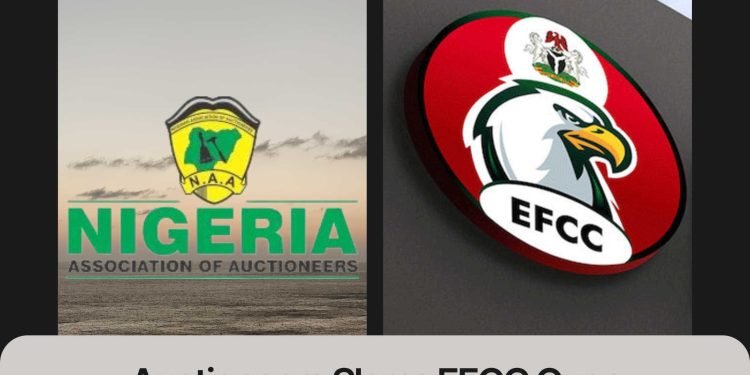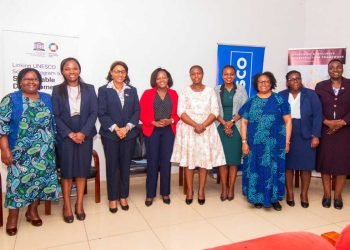The Economic and Financial Crimes Commission (EFCC) finds itself under intense scrutiny as auctioneers raise fresh concerns over the agency’s e-auctioning process. A group of auctioneers under the Nigerian Association of Auctioneers has expressed deep dissatisfaction with the EFCC’s latest e-auctioning exercise, accusing the agency of transparency in the allocation of auction lots. This comes in the wake of a similar debacle in 2022, where numerous bidders who won high-value items like vessels were never allocated their winnings, leaving the process mired in controversy.
2022 E-Auction Failure: A Painful Reminder
Auctioneers have not forgotten the fiasco of 2022, when the EFCC’s first attempt at e-auctioning left many high and dry. Winners of major auctioned items, including vessels, found themselves without the goods they had rightfully won through the bidding process. The EFCC’s refusal to invite the concerned auctioneers for a review or even provide an official report on the auction’s outcome continues to leave a bitter taste.
“This is a replay of 2022, where the lack of accountability and transparency in the e-auctioning process has once again surfaced,” the aggrieved auctioneers noted. The lack of communication from the commission, coupled with the refusal to address the outcome of the previous auction, has cast a long shadow over the integrity of the current e-auctioning system.
EFCC’s Hidden Agenda: Deliberate Exclusion of Northern Auctioneers
Auctioneers also claim that the EFCC deliberately introduced the e-auctioning process to exclude and short-change the North West and North East regions from participating. Nigerians are generally less interested with e-auctioning technology because of its non-transparent nature. Moreover, the commission reportedly gave only a four-day notice for the development and presentation of an e-auctioning solution, an impossible timeline according to experienced auctioneers.
“How is that even possible?” one auctioneer asked rhetorically. “As experienced auctioneers, we know the complexity of such systems, and they cannot be developed in such a short notice.” After a week, the EFCC allegedly shut the door on auctioneers’ attempts to present alternative solutions, claiming they had already concluded their plans.
Furthermore, the auctioneers allege that most of the seized items come from Nigerian fraudsters. They suspect that the EFCC’s e-auctioning platform is designed to allow these fraudsters to reclaim their seized assets by bidding anonymously. “In simple terms, EFCC is trying to give the fraudsters back their seized assets indirectly,” one auctioneer boldly stated.
Biased Allocation and Exclusion
Auctioneers have also raised questions about the fairness of the allocation of auction lots. Some auctioneers received significantly fewer items compared to others, leading to calls for a review of the allocation process to ensure fairness and equity.
“The public, the ultimate beneficiary of these auctions, is being sidelined,” the auctioneers said. The law emphasizes that public auctioning processes must be open, competitive, and accessible to all. However, they claim the EFCC’s approach to e-auctioning seems designed to benefit a select few at the expense of many.
Regional Exclusion and Allegations of Nepotism
Adding to the controversy are accusations that specific geopolitical zones, particularly the North West and North East, were completely excluded from the e-auctioning process, in what appears to be a blatant violation of Nigeria’s federal character principle. Furthermore, allegations of nepotism have emerged, with concerns over the appointment of a mother-and-son duo to oversee e-auctions in the North Central zone. This has raised serious questions about impartiality, especially given that neither of them has any documented or known experience in e-auctioning, further undermining the credibility of the process.
“Merit and transparency should be the guiding principles for these appointments, not familial ties,” the group said, urging the EFCC to revisit these decisions to preserve the credibility of the auction process.
The Way Forward: Will EFCC Rise to the Challenge?
The auctioneers are not just raising concerns; they are offering solutions. Citing extant circulars from the Office of the Head of the Civil Service of the Federation and the Office of the Accountant General of the Federation, they emphasized that auctioning processes must be open, transparent, and competitive. They urged the EFCC to adopt a hybrid approach that combines both traditional and e-auctioning methods to ensure wider participation and public trust.
Notably, out of the 17 contracted auctioneers, 6 were given special priority, receiving high-value assets such as cars and other high valuable items. In contrast, the remaining 11 were only allocated smaller items, including electronics and household goods. This lopsided distribution has fueled accusations of favoritism, with many auctioneers questioning the fairness and transparency of the process, particularly in the allocation of these lucrative assets.
With the ghosts of the failed 2022 e-auction still haunting the EFCC, the current controversy raises critical questions about the commission’s commitment to fairness and accountability. Will the EFCC finally address these grievances and restore confidence in its auctioning processes, or will history repeat itself? The ball is now in the EFCC’s court.
Alh. Uba Bauchi,
National Treasurer
National Association of Nigerian Auctioneers.










![Portable Orders Assault On Car Dealer Over Delayed Vehicle Delivery [VIDEO]](https://accesspost.ng/wp-content/uploads/2024/09/Portable-120x86.jpg)


